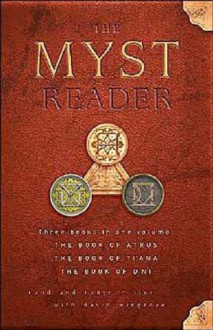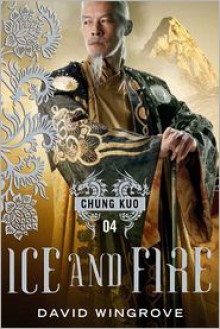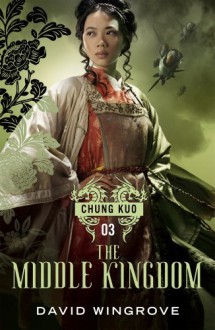Ever since my mother read The Hobbit to me as a bedtime story I thought about writing my own fantasy novel. As the years went by I increased my scope of reading to include science-fiction as well and quickly became a full on geek. I would try little stories here and there but was always disappointed in them. I felt I needed more experience and I needed to read more, to learn from published authors. As the years and books went by I noticed something, there were many recurring aspects in each genre. They all centered around western, anglo-saxon, heterosexual culture, and I craved more diversity. The books I loved the most were the ones that showcased an author’s imagination. That imagination had to break away from the norm and give me something I had not seen. I got bored with elves and dwarfs and farm boy heros. I also studied history, and not just western history, and began wondering, if history was such a driving force in writing speculative fiction, why was only western history utilized?
Diversity is something I have always wanted out of the world. Why eat the same things, why listen to the same thing, read the same things, watch the same things. There are so many perspectives to enjoy and that strengthens whatever subject matter you are enjoying. Which is why I was happy to read some articles recently on bringing more diversity into the Geekworld. People are saying we need authors from all walks of life and our stories must also reflect the different levels of society, that genres of science fiction and fantasy should be used, as I believe they were intended, to further social dialogue and open others minds to different views of our world. Also, this should be across the broad, novels, video games, comic books, movies, everything. I could not agree more, but I have concerns when people use social politics to define art, rather than allowing art to define social politics.
An example I shall use is music. I have always loved music and all different kinds. When I was young I got into rap, well that is what it was called in the ’80’s. Back then there were many artists and each had their own distinct style and content. There was politically motivated rap, like Public Enemy and Boogie Down Productions. There were artists who used humor, like Slick Rick and Too Short. There was female rappers, like MC Lyte and Queen Latifah,and rappers who weren’t black, like 3rd Base and The Beastie Boys. Rap was crossing over into other genres of music when groups like Run D.M.C and Areosmith played together, or when Boo-Yaa Tribe mixed in metal with their music. Gangster Rap was one of many and there was so much to be enjoyed. Then the industry changed and only Gangster Rap was recorded and only intimidating black men could be Gangster Rappers. Rappers who didn’t fit this profile weren’t signed and many careers died while others never got started. Somewhere along the way, because of the industry or perhaps the because of public opinion, limitations based on race and gender were placed on the young art form of Hip-hop. It was during these dark times that the genre lacked diversity and I got bored with it and walked away.
Years went by before anything else got radio play, but then artists like Eminem, Common and others who didn’t play Gangster Rap and didn’t talk about the same things the Gangsters did, started came around. Now with the internet there are many acts out there making music, and I once again enjoy Hip-hop. I listen to artists from around the world, Thailand, Japan, England, Germany, as well as great artists from America. I especially like many from the Seattle area, like Macklemore, who is ok, and one of my all time favorites, Blue Scholars. Who, on a side note, are the perfect blend of intelligent, emotional, socio-political lyrics supported by solid, smooth flowing jazzy beats. Diversity is returning to rap, but some might not see that.
I bring up Macklemore for a reason, as he was the source of a few comments and articles concerning themselves with his success at VMAs. It was being said that very few, if any black artists were being awarded any moon men in categories that have been traditional dominated by black artists for decades now. Instead, white people, performing ‘black’ music were winning those awards, like Macklemore. What was being hinted at was conspiratorial racism by the music industry which still favors white people. While I am one of the first people to say that America still has a horrible race problem and I believe it is becoming worse everyday, I found such beliefs to be somewhat racist themselves.
Based on the logic being used here any ethic group engaging in an art form that their ethnic group is not the progenitor of can never be recognized as having skill or mastery over said art form. So, only black people can be awarded for being musicians of blues, jazz, rock n’ roll, hip-hop and can never be awarded for their work in symphonic or operatic pieces. Therefore, talents like Kathleen Battle and Jesse Norman would never be recognized as two of the worlds greatest operatic voices. A similar argument was made when Living Colour was winning awards for their album, Vivid, in 1989. People were saying that an all black rock band couldn’t be as good as an all white group. I begged to differ, for that album was awesome and I have been a fan of them ever since that release. Stupid, thoughtless logic if you ask me. I believe, however, that this is the result of calling for diversity and then trying to define who is allowed and who isn’t to engage in the creation of that diversity.
So, why am I talking about rap when I started talking about speculative fiction? Because, the Geekworld, just like Hip-hop, requires diversity. In fact, diversity is why such a world was born in the first place and for it to continue to thrive and create art for generations to enjoy, it needs diversity. So, it can’t be solely based out of a euro-centric ethnic view. It can’t be male dominated, and it can’t represent only one aspect of romantic relationships. It can’t be sexist, so no chain-mail bras and maidens in distress. It can’t be homophobic, Orson Scott Card, you have ruined your legacy. It can’t be racist, so if the main character isn’t a white farm boy, who is foretold to harness great power despite being a complete talentless twit, you should read it. That all being said, there are pitfalls I believe the Geekworld might fall into, due the simplicity and infantile nature of internet social portals such as the Twitterverse and fan websites which will have a hand in controlling the diversity dialogue.
What I am worried about is that the same thinking which would deny someone an award based off their lack of connection to the progenitor group of the art form they excel in would creep into the Geekworld. People would say that someone like me, a white, heterosexual male, would know nothing about the experiences of a fictional black skinned, lesbian in a fantasy world that I created, simply because I can not fully empathize with the experience of African-American women. On a brief side note, I wish to state that regardless of how well I might intellectually understand the experiences of others, not having lived in their shoes I am limited in how much I can speak on the issues effecting their lives. Having said that, when creating pure fiction which has little connection to our real world, out of my own mind, I am the only one who can speak on it. Plus, I am a human being, as is everyone who would read my work. Meaning, that if a person has an ample understanding of the human condition and talent with a language and storytelling skills, why can’t they tell any story they wish? I also fear that race will drive too much of the issue. I believe that a great deal of diversity in science fiction and fantasy has more to do with ignorance and a lack of education. Consider American authors raised in a crumbling and endangered educational system and under the influence of a money driven entertainment industry that always produces the least common dominator for our undiscerning enjoyment. These authors would know little to nothing of the world outside of America and perhaps Europe. I will use the author David Wingrove as an example.
Wingrove wrote a science fiction series called Chung Kuo, which suggests that the future will be ruled by a super powerful Chinese government which brings the old style imperial rule of ancient Chinese monarchies back to life. When it first came out people laughed at it, said it was too unbelievable and criticized how he portrayed aspects of Chinese culture. Now, his entire series, which was not fully published twenty years ago is finally being published. Why? Well, it is easier for people to see a China that is becoming more powerful and influential throughout the world. Also, more people have been exposed to aspects of Chinese culture and realize that Wingrove was not that far off about somethings in his fictional future. Now, if the social politics that were applied to the VMAs were to play apart in Wingrove’s artistic endeavor we would question if a white man has the right to write about Chinese people who live in a fictional future. Would this white, British, heterosexual man have the intellectual and emotional understanding to accurately portray Asian people in the future? This sounds silly. How different are people from other people? If Wingrove wrote a historical novel or a contemporary one there would be room to question it, as in the case of Memoirs of a Geisha author Arthur Golden. Golden had to prove somewhat that he knew what he was talking about and reveal his source for the story was a real Japanese woman. It makes sense to question Golden, but Wingrove, or anyone writing something like Wingrove?
I believe at this time, we, who consider ourselves members of the Geekworld, are not in terrible danger of being so closed minded and taking up any extremes. So, I believe as more authors of varying backgrounds add their voices there will be little resistance to them. I should clarify that I speak about the big picture, the long term, over all conclusion of efforts to introduce diversity. Of course some will hedge and haw, but they will be silenced. For, I believe that we are hungry for such diversity and have grown tired of the same tales being told. I also believe that we aren’t that comfortable with letting the mass market entertainment industry telling us what we want. Which is why we take to the internet and condemn the sexism behind steel bikinis, or Star Fleet officer Dr. Carol Marcus being made to run around in her underwear on the Enterprise. So, this blog I am writing is just a warning, to make sure we judge artists by the quality of the work and the expanse of their imagination, and their empathy with the human condition, not their ethnic background. For we cannot keep telling each other that there is little to no differences between human beings and then draw lines saying one person can never understand another. I have always found refuge within the world of speculative fiction, within the Geekworld and I want everyone to find that same refuge. A refuge that embraces our diversity and shows us we are more alike in our humanity then in our superficial pigmentation.


 Log in with Facebook
Log in with Facebook 








